|
|
|
Sort Order |
|
|
|
Items / Page
|
|
|
|
|
|
|
| Srl | Item |
| 1 |
ID:
190165
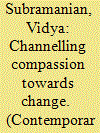

|
|
|
|
|
| Summary/Abstract |
This article explores how young elite urban professionals and fresh graduates in Mumbai and Delhi are fostering diverse aspirations of service, entrepreneurship and charting new professional mobilities through volunteering opportunities at a well-known corporate-supported non-governmental organisation (NGO), the Teach for India (TFI) programme. Mostly with commerce, engineering and management educational backgrounds, the TFI intervention operates as a nodal site for these elite youth to not just serve underprivileged children through ‘acts of compassion’ but also channel their experiences to understand the education system and reinvigorate it through corporate management values of enterprise and performance. Through examining the trajectories of these individuals, I foreground the nascent terrain of technocratic expertise being shaped through an interlinked collective of corporate NGOs that have become prominent in advising the Delhi state government, under the leadership of the Aam Aadmi Party (AAP), to improve public education through discourses of enterprise and performance.
|
|
|
|
|
|
|
|
|
|
|
|
|
|
|
|
| 2 |
ID:
190167


|
|
|
|
|
| Summary/Abstract |
This article explores how a devotional performance genre called the māla in Arabi Malayalam continues to fashion devotional piety for many Mappila men and women in contemporary Kerala. My analysis will focus on the practices of Mappila literary culture – especially that of reciting literary texts composed in Arabi Malayalam. Highlighting the performative dimensions of two māla songs, the early seventeenth century Muhyiddin Māla and the early twentieth century Nafisat Māla, I map out, in ethnographic detail, how these devotional song-poems punctuate everyday life for many contemporary Mappilas, thereby helping shape and hone these Mappilas’ affects of piety and their larger ways of being and acting in the world. In so doing, my aim will also be to underscore the social life and tone of Mappila literary culture and to reiterate that literary genres are not mere ideas but also constitutive practices that are highly consequential for the practitioners’ self-fashioning and ethical formation. The article urges a contextural approach to the study of devotional literature whereby due attention is paid to both the ‘context(s)’ and ‘texture(s)’ of genre and literary cultures.
|
|
|
|
|
|
|
|
|
|
|
|
|
|
|
|
| 3 |
ID:
190170
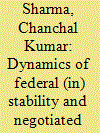

|
|
|
|
|
| Summary/Abstract |
Many studies have demonstrated a trend towards greater centralization of the federal system in India since 2014. However, the causal mechanisms that underpin this centralization remain underexplored. This article systematically explores the processes involved in tipping the delicate federal balance in favour of greater central control, and in doing so pays particular attention to the role of the party system therein. Our analytical narrative is structured around the assertion that ‘negotiated cooperation’ is contingent upon: (a) the interaction between constitutional structure and federal politics; (b) the capacity and willingness of subnational incumbents to safeguard their policy space and (c) the nature of party organization and the ideological disposition of the polity-wide parties towards territorial power-sharing. Drawing from India’s experience since 1952, we demonstrate that a dominant party system does not necessarily entail encroachment on subnational authority. At the most, it is a necessary but insufficient condition for federal imbalance. However, the problem of federal encroachment arises only when the dominant party is internally centralized and personalized, advocates unitarism and operates in a context of weak constitutional, political, procedural and judicial safeguards for self-and shared-rule. India under the leadership of Indira Gandhi, but more recently of Narendra Modi, comes close to meeting these conditions.
|
|
|
|
|
|
|
|
|
|
|
|
|
|
|
|
| 4 |
ID:
190164
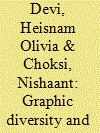

|
|
|
|
|
| Summary/Abstract |
This article describes how attention to the uses, attitudes, and perceptions of various scripts may provide a dynamic picture of the construction of ethnic identity beyond the framework of ethnic conflict in the northeastern Indian state of Manipur. Currently, the languages of Manipur are written in several scripts such as Eastern Brahmi, Roman, Meitei Mayek, and Zo script. Drawing on data collected from interviews of college-age residents of Manipur from different ethnic backgrounds, representatives of cultural organizations in the hills and plains, and from analysis of social, print, and audio-visual media, the article argues that the alignments between script, ethnic identity, and territory are not stable but change in relation to individuals’ or organizations’ positionality towards broader social and political ideologies. In graphically diverse regions such as Manipur, script serves as a semiotic resource through which people can incorporate distinct, but overlapping, ideas of belonging in the construction of ethnic identity.
|
|
|
|
|
|
|
|
|
|
|
|
|
|
|
|
| 5 |
ID:
190166
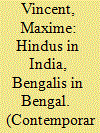

|
|
|
|
|
| Summary/Abstract |
As the Communist and Congress Parties continue their downfall in West Bengal, two parties relying heavily on identity politics are entrenching their positions as the main political forces of the state: the Trinamool Congress with its pro-Bengali discourse and the Bharatiya Janata Party with its pro-Hindu discourse. Yet, we know little about how the political mobilization of these different regional and religious identities interact in potentially conflicting manners and inform political choices, especially among groups and individuals who identify with both. This paper interrogates the relationship between regional identity, religious identity and political opinions in the state of West Bengal. Backing its conclusions with the results of a qualitative study investigating multi-ethnic Hindu religious organizations, this article argues that, although strongly identifying as a Hindu favours the endorsement of Hindu Nationalist political ideas, identification to the Bengali identity is a stronger determinant of one’s vote.
|
|
|
|
|
|
|
|
|
|
|
|
|
|
|
|
| 6 |
ID:
190163
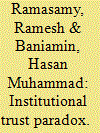

|
|
|
|
|
| Summary/Abstract |
The article explores institutional trust dynamics in Sri Lanka and asks what accounts for varying levels of trust different ethnic groups have in governance institutions in the post-war context. Three decades of ethnic conflict, the emergence of ethno-religious polarisation since the end of civil war, militarised ethnocracy, and the majoritarian ethnocratic state all highlight the need to understand these dynamics. The article presents the results of twonationally representative surveys on institutional trust in Sri Lanka (2015 & 2020), which showed a puzzling trend: in 2015, minorities had higher trust in public institutions, whereas, in 2020, the same minorities had lower trust. The study finds that citizens’ evaluation of public institutions is affected by ethnic cleavages, institutional fairness, and perceived performance. On the one hand, Sinhala–Buddhist ideology and dominance of ethnic majority in public institutions are more likely to determine institutional trust among the ethnic majority Sinhalese; on the other, perceived injustice and unfair treatment shapes institutional trust among the ethnic minorities. Overall, the study finds that an increase in institutional performance may not be sufficient; institutionalising equal treatment, fairness, and enhancing governance quality are necessary to enhance institutional trust among all ethnic groups in ethnically polarized societies.
|
|
|
|
|
|
|
|
|
|
|
|
|
|
|
|
| 7 |
ID:
190168
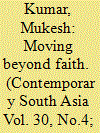

|
|
|
|
|
| Summary/Abstract |
This article historically and anthropologically examines the issue of religious conversion and identity formation among a Jogi community of religious converts. They were previously Muslims and changed their religious association to Hinduism after 1947. Individual and collective narratives of their religious conversion and the problems associated with forming a respected socio-religious identity indicate that religious conversion in South Asia is a non-linear event symbolising a complex process of becoming Hindu. The Muslim Jogis were not accepted by the Hindu Jogis after these conversions, leading to the formation of a new Jogi caste community called the Suddhi (purified) Jogis, popularly recognised in Alwar as a caste of converts. The community members still struggle to assert their Hindu identity. This article argues that converting to Hinduism may result in ‘social stasis’, signifying a ‘perpetual state of becoming’ due to the lack of complete social acceptance of converts by the traditionally recognised caste communities of ‘Hindus’.
|
|
|
|
|
|
|
|
|
|
|
|
|
|
|
|
| 8 |
ID:
190169
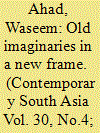

|
|
|
|
|
| Summary/Abstract |
Newly emerging ‘social problem films’ on Kashmir appear as a shift from the conventional construction of Kashmir and Kashmiris in Bollywood. This study, through critical narrative analysis (CNA), examines the politics behind the representation of the ‘social problems’ of Kashmir in recent Hindi films. As the narratives of these films are marked by selectivity and arrangement of historical events, this study demonstrates that Orientalist tropes continue to figure in the films in new forms. It is demonstrated that the films, whose narratives are fully dedicated to the ‘inside’ of Kashmir, inflict layered violence against the actual political and historical realities of the region. While engaging with the colonial and post-colonial binary trope of people-versus-land, the films not only obfuscate the historical context, they vindicate an outside intervention by presenting an axiomatic image of the events, cut off from their socio-political and historical roots. The two films under scrutiny in this study are Haider (2014) and Laila Majnu (2018). The subject matter of both is Kashmiri youth, and far from unveiling the ‘youth problems’ of Kashmir, they end up constructing a fresh imagery in which the ‘psychotic’ behaviour and trauma of Kashmir’s ‘misguided’ youth is socially located and explained.
|
|
|
|
|
|
|
|
|
|
|
|
|
|
|
|
| 9 |
ID:
190162
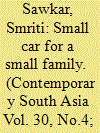

|
|
|
|
|
| Summary/Abstract |
The Maruti Suzuki joint venture between the Government of India and the Japanese Suzuki Motor Corporation in 1983 launched India’s first ‘people’s car’ – the Maruti 800. This article argues that the conceptualisation and promotion of the Maruti 800 as the ideal car for a small, middle class family revealed subtle continuities with the controversial family planning programme of the state which had reached its peak during the internal ‘Emergency’ of 1975. By associating the Maruti 800 – an object of aspiration for an emerging middle class and of at least potential mass consumption – with a small family, the state reiterated its message of population control albeit subliminally. The article further suggests that the adoption of Japanese management practices at Maruti, which laid emphasis on hard work and loyalty to the company-family, was in line with Prime Minister Indira Gandhi’s desire to enforce discipline and enhance labour productivity, a notion also vocalised during the Emergency. Finally, the article illustrates how the ‘people’s car’ project placed the Indian state as the ‘driver’ of middle class aspirations and mobility in 1980s’ India, a full decade before the liberalisation reforms of 1991.
|
|
|
|
|
|
|
|
|
|
|
|
|
|
|
|
| 10 |
ID:
190171
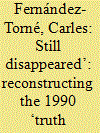

|
|
|
|
|
| Summary/Abstract |
Experts agree that in 1990, Nepal established a truth commission to investigate disappearances that allegedly happened between 1960 and 1990. Little is known about this truth-seeking mechanism. Most of what has been published refers to the Mallik Commission, a better-known commission established also in 1990. This Research Note presents new data on the Committee on Disappearances. It examines the process through which the Committee came to be and speculates that the main purpose for its establishment might have been to examine the disappearances of seven people in relation to the 1985 bombing, a series of explosions targeting the monarchy. The Note presents the main findings compiled in the Committee’s final report and examines the reasons why the final report was never published.
|
|
|
|
|
|
|
|
|
|
|
|
|
|
|
|
| 11 |
ID:
190161
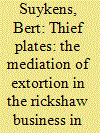

|
|
|
|
|
| Summary/Abstract |
Around half a million rickshaws ply the streets of Dhaka, Bangladesh. To deal with the problem of theft, owner associations started to issue ‘thief plates’. These allow owners to get their rickshaws back at a reduced price. They also offer a protection against theft. This article argues that these plates form material mediators brokering relations between rickshaw owners and drivers, and thieves. Building on the literature on state-citizen brokerage, bureaucratic materialities and Anton Blok’s work on mafia, it wants to highlight the centrality of mediation in understanding practices of protection/extortion. It also aims to contribute to the literature on mafia in South Asia, showing the need to pay attention to norms of non-violence when dealing with violent or criminal strongmen.
|
|
|
|
|
|
|
|
|
|
|
|
|
|
|
|
|
|
|
|
|